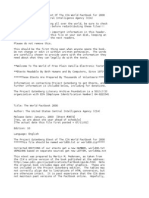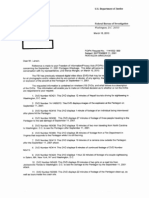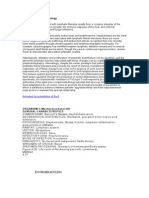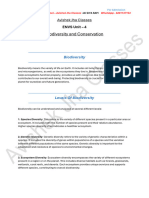PRISM
PRISM
Uploaded by
bobktg82Copyright:
Available Formats
PRISM
PRISM
Uploaded by
bobktg82Original Description:
Copyright
Available Formats
Share this document
Did you find this document useful?
Is this content inappropriate?
Copyright:
Available Formats
PRISM
PRISM
Uploaded by
bobktg82Copyright:
Available Formats
Everything you need to know about PRISM | The Verge
http://www.theverge.com/2013/7/17/4517480/nsa-spying-prism-surveill...
By T.C. Sottek and Josh Kopstein Since September 11th, 2001, the United States government has dramatically increased the ability of its intelligence agencies to collect and investigate information on both foreign subjects and US citizens. Some of these surveillance programs, including a secret program called PRISM, capture the private data of citizens who are not suspected of any connection to terrorism or any wrongdoing. In June, a private contractor working for Booz Allen Hamilton leaked classified presentation slides that detailed the existence and the operations of PRISM: a mechanism that allows the government to collect user data from companies like Microsoft, Google, Apple, Yahoo, and others. While much of the program and the rest of the NSAs surveillance efforts are still shrouded in secrecy, more details are coming to light as the public, as well as its advocates and representatives, pressure the government to come clean about domestic spying.
1 of 10
1/23/2014 3:46 AM
Everything you need to know about PRISM | The Verge
PRISM is revealed in leaked slides: (http://www.theverge.com /2013/6/6/4403868/nsa-fbimine-data-apple-googlefacebook-microsoft-othersprism/in/4167369) The Washington Post and The Guardian obtain a leaked 41-slide security presentation. Both publications say that according to the slides, PRISM is considered a highly classified program that allows the National Security Agency and Federal Bureau of Investigation to retrieve data directly from Microsoft, Yahoo, Google, Facebook, PalTalk, AOL, Skype, YouTube, and Apple. Companies deny knowledge and participation in PRISM: (http://www.theverge.com /2013/6/6/4404112/nsa-prismsurveillance-apple-facebookgoogle-respond/in/4167369) While the Post and the Guardian allege based on the leak that the NSA had direct access to the servers of Microsoft, Google, Apple, and others, spokespeople representing the companies deny involvement in the program, let alone knowledge of it. US national intelligence director responds: (http://www.theverge.com /2013/6/6/4404670/us-directorof-national-intelligencedefends-nsa-fbi-surveillanceprism/in/4167369) Following the outbreak of the PRISM story, the US national intelligence director, James Clapper, release multiple statements regarding the leak. Clapper downplays the scandal, asking the public to simply trust that the agency respects civil liberties.
http://www.theverge.com/2013/7/17/4517480/nsa-spying-prism-surveill...
What the hell is PRISM? PRISM is a tool used by the US National Security Agency (NSA) to collect private electronic data belonging to users of major internet services like Gmail, Facebook, Outlook, and others. Its the latest evolution of the US governments post-9/11 electronic surveillance efforts, which began under President Bush with the Patriot Act, and expanded to include the Foreign Intelligence Surveillance Act (FISA) enacted in 2006 and 2007. Theres a lot we still dont know about how PRISM works, but the basic idea is that it allows the NSA to request data on specific people from major technology companies like Google, Yahoo, Facebook, Microsoft, Apple, and others. The US government insists that it is only allowed to collect data when given permission by the secretive Foreign Intelligence Surveillance Court.
Classified presentation slides detailing aspects of PRISM were leaked by a former NSA contractor. On June 6th, The Guardian and The Washington Post published reports based on the leaked slides, which state that the NSA has direct access to the servers of Google, Facebook, and others. In the days since the leak, the implicated companies have vehemently denied knowledge of and participation in PRISM, (http://www.theverge.com/2013/6/6/4404112/nsa-prism-surveillance-applefacebook-google-respond/in/4167369) and have rejected allegations that the US government is able to directly tap into their users data. Both the companies and the government insist that data is only collected with court approval and for specific targets. As The Washington Post reported, PRISM is said to merely be a streamlined system varying between companies that allows them to expedite court-approved data collection requests. Because there are few technical details about how PRISM operates, and because of the fact that the FISA court operates in secret, critics are concerned about the extent of the program and whether it violates the constitutional rights of US citizens.
UK Government allegedly involved in PRISM: (http://www.theverge.com /2013/6/7/4405906 /uk-government-is-allegedlyinvolved-in-us-internet-spyingprogram/in/4167369) The Guardian reports that the UK government is also involved in the PRISM program, and that the UKs Government
2 of 10
1/23/2014 3:46 AM
Everything you need to know about PRISM | The Verge
Communications Headquarters (GCHQ) has been able to view private internet user-data since 2010 under the NSAs program. President Obama responds: (http://www.theverge.com /2013/6/7/4406416/presidentobama-on-nsa-spyingcongress-has-known-aboutit-and/in/4167369) The president attempts to deflect outrage about the PRISM program, claiming that Congress has known about it and approve it for years, but says he welcomes debate.
http://www.theverge.com/2013/7/17/4517480/nsa-spying-prism-surveill...
Whistleblower reveals himself: (http://www.theverge.com /2013/6/9/4412080/edwardsnowden-comes-out-asnsa-whistleblower-i-dontwant-to-live-in/in/4167369) The man responsible for the leak, 29-year-old Booz Allen Hamilton contractor Edward Snowden, reveals himself. He describes himself as a whistleblower, and in refuge in Hong Kong, says he does not expect to see home again.
As The Washington Post reported, The Protect America Act of 2007 led to the creation of a secret NSA program called US-984XN also known as PRISM. The program is said to be a streamlined version of the same surveillance practices that the US was conducting in the years following 9/11, under President George W. Bushs Terrorist Surveillance Program. The Protect America Act allows the attorney general and the director of national intelligence to explain in a classified document how the US will collect intelligence on foreigners overseas each year, but does not require specific targets or places to be named. As the Post reports, once the plan is approved by a federal judge in a secret order, the NSA can require companies like Google and Facebook to send data to the government, as long as the requests meet the classified plans criteria.
Public pressure results in action from Congress: (http://www.theverge.com /2013/6/11/4419006/senatebill-would-declassifyfisc-orders-for-nsasurveillance) Amid mounting public concern, widespread media reports, and interest from lawmakers in the leak, a bipartisan group of eight US senators announce a bill to declassify the court opinions that allow the NSA to conduct PRISM surveillance, as well as the phone records program that leaked days before PRISM went public.
Government defends surveillance programs: NSA director, General Keith Alexander, tells Congress that over 50 terrorist plots were stopped by surveillance efforts since 9/11. Meanwhile, President Obama defends the
3 of 10
1/23/2014 3:46 AM
Everything you need to know about PRISM | The Verge
NSAs program in an interview on the Charlie Rose program, but offers no new information about PRISM.
http://www.theverge.com/2013/7/17/4517480/nsa-spying-prism-surveill...
NSAs targeting and minimization procedures leaked (http://www.theverge.com /2013/6/20/4449738/leakeddocuments-reveal-the-nsastop-secret-rulesfor-warrantless-surveillance) The NSAs long sought-after guidelines for targeted surveillance seem to refute Obamas claims that PRISM does not apply to Americans. The documents show how the agency tries to avoid US citizens, but reveal a broad set of circumstances where Americans communications can be retained.
Edward Snowden, a 29-year-old intelligence contractor formerly employed by the NSA, CIA, and Booz Allen Hamilton, confessed responsibility for leaking the PRISM documents. He revealed himself on June 9th, three days after reports on PRISM were published; in an interview with The Guardian, Snowden said, I dont want to live in a society that does these sort of things, and claimed he was motivated by civic duty to leak classified information. Snowden left the United States prior to leaking the documents in order to avoid capture, taking refuge in Hong Kong where he stayed until June 23rd. With the
Edward Snowden flees Hong Kong seeking asylum: (http://www.theverge.com /2013/7/17/4531504/edwardsnowdens-asylumapplications-are-pilingup-but-hes-still-in-a) After the US filed charges against him and stepped up efforts to pressure Hong Kong to extradite him, whistleblower Edward Snowden flees Hong
assistance of WikiLeaks, Snowden fled Hong Kong for Moscow, and has requested asylum in Ecuador, Russia, and other countries. He is still residing in a Moscow airport, waiting to be granted asylum.
4 of 10
1/23/2014 3:46 AM
Everything you need to know about PRISM | The Verge
Kong. With the help of WikiLeaks, Snowden flew to a Moscow airport where he continues to live awaiting asylum. (http://www.theverge.com /2013/7/17/4531504/edwardsnowdens-asylum-applicationsare-piling-up-but-hes-still-in-a)
http://www.theverge.com/2013/7/17/4517480/nsa-spying-prism-surveill...
New PRISM slides revealed: New PRISM slides revealed by The Washington Post suggest that PRISM has over 100,000 records, and the Post says these refer to active surveillance targets. The new slides also directly refer to real-time monitoring of email, text, or voice chats.
Nationwide protests in the United States: Restore the Fourth rallies take place across the US on the 4th of July, protesting NSA spying.
While PRISM has been the most talked-about story to come out of Snowdens leaks, the disclosures have shed light on a vast array of NSA surveillance programs. Broadly speaking, these can be split into two categories: upstream wiretaps, which pull data directly from undersea telecommunications cables, and efforts like PRISM, which acquire communications from US service providers. One of the slides in the leaked PRISM presentation instructs that analysts should use both of these sources. NSA programs collect two kinds of data: metadata and content. Metadata is the sensitive byproduct of communications, such as phone records that reveal the participants, times, and durations of calls; the communications collected by PRISM include the contents of emails, chats, VoIP calls, cloud-stored files, and more. US officials have tried to allay fears about the NSAs indiscriminate metadata collection by pointing out that it doesnt reveal the contents of conversations. But metadata can be just as revealing as content internet metadata includes information such as email logs, geolocation data (IP addresses), and web search histories. Because of a decades-old law (http://www.theverge.com/policy/2013/3/11/4088842 /electronic-communications-privacy-act-modernization-reform) , metadata is also far less well-protected than content in the US.
A leaked court order provided by Snowden showed that Verizon is handing over
5 of 10
1/23/2014 3:46 AM
Everything you need to know about PRISM | The Verge
http://www.theverge.com/2013/7/17/4517480/nsa-spying-prism-surveill...
the calling records and telephony metadata of all its customers to the NSA on an ongoing, daily basis. Mass collection of internet metadata began under a Bush-era program called "Stellarwind," which was first revealed by NSA whistleblower William Binney. The program was continued for two years under the Obama administration, but has since been discontinued and replaced with a host of similar programs with names like EvilOlive and ShellTrumpet.
6 of 10
1/23/2014 3:46 AM
Everything you need to know about PRISM | The Verge
http://www.theverge.com/2013/7/17/4517480/nsa-spying-prism-surveill...
Many crucial details on how and under what circumstances the NSA collects data are still missing. Legally speaking, surveillance programs rely on two key statutes, Section 702 of the FISA Amendments Act (FAA) and Section 215 of the Patriot Act. The former authorizes the collection of communications content under PRISM and other programs, while the latter authorizes the collection of metadata from phone companies such as Verizon and AT&T. However, multiple reports and leaked documents indicate the statutes have been interpreted in secret by the FISA intelligence courts to grant much broader authority than they were originally written to allow. They also indicate that the FISA courts only approve the NSAs collection procedures, and individual warrants for specific targets are not required. An analyst starts by inputting selectors (search terms) into a system like PRISM, which then tasks information from other collection sites, known as SIGADs (Signals Intelligence Activity Designators). SIGADs have both classified and unclassified code names, and are tasked for different types of data one called NUCLEON gathers the contents of phone conversations, while others like MARINA store internet metadata. Leaked documents show that under the agencys targeting and minimization rules, NSA analysts can not specifically target someone reasonably believed to be a US person communicating on US soil. According to The Washington Post, an analyst must have at least 51 percent certainty their target is foreign. But even then, the NSAs contact chaining practices whereby an analyst collects records on a targets contacts, and their contacts contacts can easily cause innocent parties to be caught up in the process. The rules state the analyst must take steps to remove data that is determined to be from US persons, but even if they are not relevant to terrorism or national security, these inadvertently acquired communications can still be retained and analyzed for up to five years and even given to the FBI or CIA under a broad set of circumstances. Those include communications that are "reasonably believed to contain evidence of a crime that has been, is being, or is about to be committed," or that contain information relevant to arms proliferation or cybersecurity. If communications are encrypted, they can be kept indefinitely.
7 of 10
1/23/2014 3:46 AM
Everything you need to know about PRISM | The Verge
http://www.theverge.com/2013/7/17/4517480/nsa-spying-prism-surveill...
In the weeks since the PRISM documents leaked, a widespread international public debate about the United States governments surveillance and spying programs has engulfed the NSA, Congress, and the Obama administration in controversy. While outspoken supporters of NSA surveillance in Congress and the White House including President Obama have defended the legality and necessity of the programs, some US lawmakers are pushing back. In June, a bipartisan group of senators unveiled a bill that aims to rein in the problematic legal provisions that give US intelligence agencies nearly unfettered authority to conduct warrantless surveillance on domestic and foreign communications. Several other lawmakers have introduced their own measures, but legislative reform is still in early stages. Meanwhile, a diverse coalition of interest groups and private organizations are directly challenging some of the NSAs surveillance programs in court. (https://projects.propublica.org/graphics/surveillance-suits) On July 16th, a broad coalition of plaintiffs sued the US government for an illegal and unconstitutional program of dragnet electronic surveillance, in which the NSA scoops up all telephone records handled by Verizon, AT&T, and Sprint in the US. Separate suits brought by the Electronic Privacy Information Center and the American Civil Liberties Union are also in the works, but the government hasnt responded to the allegations in court yet. The companies at the heart of PRISMs controversy are also acting out, but the specific details regarding their involvement in government surveillance on US citizens is still unclear. Microsoft, Google, Yahoo, and others have stepped up pressure on the government in the past month to declassify the process which compels them to hand over user data to the government. In an impassioned plea made by Microsoft on July 16th, the companys general counsel Brad Smith said: We believe the US constitution guarantees our freedom to share more information with the public, yet the government is stopping us. Finally, theres the group of people most affected by PRISM and its sibling programs: the American public. On July 4th, Restore the Fourth rallies in more than 100 US cities protested the governments surveillance programs, focusing on electronic privacy. Its not clear if public outrage will result in reform, but thanks to the dramatic actions of a young intelligence contractor, we now at least have the opportunity to discuss what the US government has been hiding from the public in the name of national security.
Illustrations/Charts by Dylan C. Lathrop.
8 of 10
1/23/2014 3:46 AM
Everything you need to know about PRISM | The Verge
http://www.theverge.com/2013/7/17/4517480/nsa-spying-prism-surveill...
Log In Sign Up TF G YO
use Yahoo! or OpenID ()
Open ID Log in
forgot? Remember me? Log in Log In Sign Up TF G YO
use Yahoo! or OpenID ()
Open ID Log in
or
Continue
Forgot password?
Well email you a reset link. If you signed up using a 3rd party account like Facebook or Twitter, please login () with it instead.
Submit
Forgot password?
Try another email?
Almost done,
Register
Authenticating Great!
Choose an available username to complete sign up.
9 of 10
1/23/2014 3:46 AM
Everything you need to know about PRISM | The Verge
http://www.theverge.com/2013/7/17/4517480/nsa-spying-prism-surveill...
Sign Up
In order to provide our users with a better overall experience, we ask for more information from Facebook when using it to login so that we can learn more about our audience and provide you with the best possible experience. We do not store specific user data and the sharing of it is not required to login with Facebook.
Yes, share my data Submit
Please dont share my data
10 of 10
1/23/2014 3:46 AM
You might also like
- The Book of QDocument117 pagesThe Book of Qtincho.rojNo ratings yet
- US10337841 DEW PatentDocument23 pagesUS10337841 DEW Patentpanasonic92No ratings yet
- Operation Sunrise (THE ORIGINAL DOCUMENTS)Document44 pagesOperation Sunrise (THE ORIGINAL DOCUMENTS)Mario Colombo100% (1)
- Architects Journeys - Gsapp Books (2011) PDFDocument256 pagesArchitects Journeys - Gsapp Books (2011) PDFAndrew Pringle SattuiNo ratings yet
- A Project Report ON ": Recruitment and Selection at Hyundai Harshali HyundaiDocument75 pagesA Project Report ON ": Recruitment and Selection at Hyundai Harshali HyundaiHarsh Agrawal100% (1)
- RestDocument2 pagesRestKrista ReederNo ratings yet
- PRISM (Surveillance Program) - WikipediaDocument34 pagesPRISM (Surveillance Program) - WikipediadoggydogNo ratings yet
- New Nsa Evidence 2014Document8 pagesNew Nsa Evidence 2014JuanpolicydebatesNo ratings yet
- Updated Slides As of 1716 30 Oct Ref Clones and Dna Altering Using CovidDocument587 pagesUpdated Slides As of 1716 30 Oct Ref Clones and Dna Altering Using CovidSue Bozgoz100% (1)
- (TS) NSA Quantum Tasking Techniques For The R&T AnalystDocument28 pages(TS) NSA Quantum Tasking Techniques For The R&T Analystaclufan100% (1)
- Special Source Operation - NSA Edward Snowden LeakDocument8 pagesSpecial Source Operation - NSA Edward Snowden LeakUSNEWSGHOSTNo ratings yet
- Category - Name - DocuWikiDocument139 pagesCategory - Name - DocuWikimickey103ppxNo ratings yet
- Obama Executive Order - 2017 Presidential Transition AssemblyDocument4 pagesObama Executive Order - 2017 Presidential Transition AssemblyThe Conservative TreehouseNo ratings yet
- DARPA-BAA-16-22 Open ProjectDocument21 pagesDARPA-BAA-16-22 Open ProjectAnonymous VTLglDVNo ratings yet
- USMCA Implementation ActDocument59 pagesUSMCA Implementation ActTim BrownNo ratings yet
- Classification Essay - The InternetDocument5 pagesClassification Essay - The Internetapi-244464601No ratings yet
- Benghazi UnclassifiedDocument39 pagesBenghazi Unclassifiedcharlene zechenderNo ratings yet
- Banned PDFDocument106 pagesBanned PDFIgor AndjelkovicNo ratings yet
- 15 Questions About Mass Shooting Culminated at Las Vegas Route 91 Harvest Festival You Should Answer Truthfully.Document8 pages15 Questions About Mass Shooting Culminated at Las Vegas Route 91 Harvest Festival You Should Answer Truthfully.Find StepsNo ratings yet
- Social Media Very Likely Used To Spread Tradecraft Techniques To Impede Law Enforcement Detection Efforts of Illegal Activity in Central Florida Civil Rights Protests, As of 4 June 2020Document5 pagesSocial Media Very Likely Used To Spread Tradecraft Techniques To Impede Law Enforcement Detection Efforts of Illegal Activity in Central Florida Civil Rights Protests, As of 4 June 2020Collier Meyerson100% (1)
- Barack Obama's Department of Homeland Security Labeled Antifa's Activities As Domestic Terrorist Violence' - America's WatchtowerDocument9 pagesBarack Obama's Department of Homeland Security Labeled Antifa's Activities As Domestic Terrorist Violence' - America's WatchtowerJohn WeberNo ratings yet
- Secret History Stanford Sierra REE Rev 1Document133 pagesSecret History Stanford Sierra REE Rev 1Tsulusun Ar RoyanNo ratings yet
- Activism Resources For Federal Employees 2020Document16 pagesActivism Resources For Federal Employees 2020Expose Sunrise0% (1)
- Memex Project - DARPA (2014) DARPA-BAA-14-21Document42 pagesMemex Project - DARPA (2014) DARPA-BAA-14-21LJ's infoDOCKETNo ratings yet
- OPD - Undercover Operations (K-10)Document8 pagesOPD - Undercover Operations (K-10)KQED News100% (1)
- Hadinger - Clinton's CarnageDocument352 pagesHadinger - Clinton's Carnagemariiusssica9451100% (1)
- Giorgia Guglielmi: "Media of Mass Destruction: How Fake News Is Killing Italy's Olive Trees"Document28 pagesGiorgia Guglielmi: "Media of Mass Destruction: How Fake News Is Killing Italy's Olive Trees"MIT Comparative Media Studies/WritingNo ratings yet
- Intelligence - Echelon ArchivesDocument62 pagesIntelligence - Echelon ArchivesSimon BenjaminNo ratings yet
- Presidential Documents: Title 3 - Executive Order 13584 of September 9, 2011Document3 pagesPresidential Documents: Title 3 - Executive Order 13584 of September 9, 2011MonkNo ratings yet
- Unfinished MasterpieceDocument9 pagesUnfinished Masterpieceapi-242605797No ratings yet
- NASA 120242main Winter05oasis020405Document14 pagesNASA 120242main Winter05oasis020405NASAdocuments100% (1)
- CIA World Factbook (2000) by United States. Central Intelligence AgencyDocument1,787 pagesCIA World Factbook (2000) by United States. Central Intelligence AgencyGutenberg.org100% (4)
- Leashing The Surveillance State: How To Reform Patriot Act Surveillance Authorities, Cato Policy Analysis No. 675Document32 pagesLeashing The Surveillance State: How To Reform Patriot Act Surveillance Authorities, Cato Policy Analysis No. 675Cato InstituteNo ratings yet
- Senate Hearing, 112TH Congress - Oversight of The Federal Bureau of InvestigationDocument90 pagesSenate Hearing, 112TH Congress - Oversight of The Federal Bureau of InvestigationScribd Government Docs100% (1)
- 2017 My Militia ManifestoDocument17 pages2017 My Militia ManifestoMy MilitiaNo ratings yet
- Stargate ProjectDocument1 pageStargate ProjectJuan Simon AlzateNo ratings yet
- Larson FOIA - FBI - Pentagon - AA77Document4 pagesLarson FOIA - FBI - Pentagon - AA779/11 Document Archive100% (1)
- Darpa 2015 PDFDocument40 pagesDarpa 2015 PDFUSA TODAYNo ratings yet
- Coming Soon - Vaccine Passports Will Determine Where You Can Go and What You Can DoDocument7 pagesComing Soon - Vaccine Passports Will Determine Where You Can Go and What You Can DoWillie JohnsonNo ratings yet
- Arrest Warrant For Adolpho Nicolas PachonDocument1 pageArrest Warrant For Adolpho Nicolas Pachonapi-247852575No ratings yet
- PDF Content 72Document15 pagesPDF Content 72EyemanProphetNo ratings yet
- Emick BKDocument26 pagesEmick BKOccupyUnmasked100% (1)
- Agencies of The WorldDocument19 pagesAgencies of The WorldMuhammad ZaineNo ratings yet
- Paper 1 Oprah Winfreys School For GirlsDocument4 pagesPaper 1 Oprah Winfreys School For Girlsapi-535571700No ratings yet
- Pathogenesis and PathologyDocument12 pagesPathogenesis and Pathologydies100% (1)
- Biology: Mounting Antiscience Aggression in The United StatesDocument4 pagesBiology: Mounting Antiscience Aggression in The United StatesNatalie WintersNo ratings yet
- Big Brother Is Watching YouDocument12 pagesBig Brother Is Watching YouJames & Jytte BowersNo ratings yet
- Inside DOE, A Whistleblower's Account of DOE & Jennifer Granholm's Role in UAP Secrecy. - R - UFOsDocument6 pagesInside DOE, A Whistleblower's Account of DOE & Jennifer Granholm's Role in UAP Secrecy. - R - UFOsSimon SanggaardNo ratings yet
- USA Right The Wrong Decision Time On GuantananmoDocument62 pagesUSA Right The Wrong Decision Time On GuantananmoΘάνος ΚαμήλαληςNo ratings yet
- BILL GATES JAIL On Twitter PDFDocument297 pagesBILL GATES JAIL On Twitter PDFCOVID 19 CORONA VIRUSNo ratings yet
- Microsoft Patent 060606 - Body Interfaced Digital Currency - (We) Are The NewsDocument2 pagesMicrosoft Patent 060606 - Body Interfaced Digital Currency - (We) Are The Newsjbotha01No ratings yet
- Human Cattle CarsDocument2 pagesHuman Cattle CarsEtheristNo ratings yet
- Affidavit: False Statements at White House News Conference of 4-27-2011 - by Doug Vogt - 04 Jul 2011Document6 pagesAffidavit: False Statements at White House News Conference of 4-27-2011 - by Doug Vogt - 04 Jul 2011protectourliberty100% (1)
- Cia Npic 3 - Htautomat1956 58 - 1974 PDFDocument844 pagesCia Npic 3 - Htautomat1956 58 - 1974 PDF1hh2No ratings yet
- Case Overview1Document173 pagesCase Overview1Michelle MansfieldNo ratings yet
- 72 Types of Americans That Are Considered Terrorists - SnyderDocument5 pages72 Types of Americans That Are Considered Terrorists - SnyderPRMurphy100% (2)
- T4 B8 Hence FDR - Entire Contents - 6-4-03 Kyle Hence Email FWD by Zelikow To Team 4 and Copy of Making A Killing - Part II 504Document8 pagesT4 B8 Hence FDR - Entire Contents - 6-4-03 Kyle Hence Email FWD by Zelikow To Team 4 and Copy of Making A Killing - Part II 5049/11 Document Archive100% (1)
- Uniting The United Nations With Seven Noahide LawsDocument1 pageUniting The United Nations With Seven Noahide LawsTim BrownNo ratings yet
- How Google Took Over The White House 1 1 SMDocument352 pagesHow Google Took Over The White House 1 1 SMapi-290917515No ratings yet
- Conspiracies and Cover-Ups: Fact or Fiction?: Conspiracies and Cover-Ups, #1From EverandConspiracies and Cover-Ups: Fact or Fiction?: Conspiracies and Cover-Ups, #1No ratings yet
- The Tribulation Hand-Book: For Those Left Behind When Jesus Christ Comes for His Church of BelieversFrom EverandThe Tribulation Hand-Book: For Those Left Behind When Jesus Christ Comes for His Church of BelieversNo ratings yet
- Brutes or Angels: Human Possibility in the Age of BiotechnologyFrom EverandBrutes or Angels: Human Possibility in the Age of BiotechnologyNo ratings yet
- U.S., British Intelligence Mining Data From Nine U.S. Internet Companies in Broad Secret Program - The Washington PostDocument7 pagesU.S., British Intelligence Mining Data From Nine U.S. Internet Companies in Broad Secret Program - The Washington PostZebedeeNo ratings yet
- Perkem 2014 4a5Document10 pagesPerkem 2014 4a5bobktg82No ratings yet
- Chapter 1 Introduction To Islamic Banking and FinanceDocument42 pagesChapter 1 Introduction To Islamic Banking and Financebobktg82100% (9)
- 6034 - Classical Linear Regression ModelDocument30 pages6034 - Classical Linear Regression Modelbobktg82No ratings yet
- RSH 10 CH 15Document69 pagesRSH 10 CH 15bobktg82No ratings yet
- Job Performanc E: Mcgraw-Hill/IrwinDocument37 pagesJob Performanc E: Mcgraw-Hill/Irwinbobktg82No ratings yet
- The Purposes of Iskcon 7: A Vision RealizedDocument25 pagesThe Purposes of Iskcon 7: A Vision Realizedabsk432No ratings yet
- Scoping Review Layanan Perinatal Mental Health Oleh Bidan Di Negara AseanDocument16 pagesScoping Review Layanan Perinatal Mental Health Oleh Bidan Di Negara AseanNurul pratiwiNo ratings yet
- Alchemical MassDocument89 pagesAlchemical Massvyogacharya1040No ratings yet
- SBLC Procedures: Basic Procedures: Sblcs and PofsDocument2 pagesSBLC Procedures: Basic Procedures: Sblcs and PofschachouNo ratings yet
- Unit 1 - Personal InformationDocument23 pagesUnit 1 - Personal InformationBen TranNo ratings yet
- FREL2 PRELIM EXAM - Set01Document5 pagesFREL2 PRELIM EXAM - Set01Andrjstne SalesNo ratings yet
- Chapter 2Document24 pagesChapter 2kunti robiyatunNo ratings yet
- This Study Resource WasDocument4 pagesThis Study Resource WasRizquita DhindaNo ratings yet
- GRD - X - English - Term1 - Sample PaperDocument6 pagesGRD - X - English - Term1 - Sample Paperrandombird45No ratings yet
- Compiler Design AssignmentsDocument9 pagesCompiler Design AssignmentsBuddhadeb SarkarNo ratings yet
- Process Costing and Hybrid Product-Costing Systems: Mcgraw-Hill/IrwinDocument44 pagesProcess Costing and Hybrid Product-Costing Systems: Mcgraw-Hill/Irwinsunanda mNo ratings yet
- Envs Unit - 4 NotesDocument9 pagesEnvs Unit - 4 Notesharkiratsinghbedi770No ratings yet
- Novel StudyDocument34 pagesNovel Studyapi-297838790100% (1)
- Tle10 He Breadpastryproduction q1 Mod1 Bakingtoolsutensilsandequipment v5Document39 pagesTle10 He Breadpastryproduction q1 Mod1 Bakingtoolsutensilsandequipment v5arawne mNo ratings yet
- Lesson 4 Aldehydes and KetoneDocument4 pagesLesson 4 Aldehydes and KetoneMARY JANE ANGELICA SEVANo ratings yet
- The Razgriz ReturnsDocument7 pagesThe Razgriz ReturnsBlueGalaxyDevNo ratings yet
- Listening Scripts and AnswersDocument64 pagesListening Scripts and AnswersMít ƯớtNo ratings yet
- Shalby Research Report For Nov 2022Document37 pagesShalby Research Report For Nov 2022SANDIP MISHRANo ratings yet
- INVOICE# 1557324: QTY Ordered Back-Ordered QTY Shipped Stock Number Information Unit Price Total AmountDocument2 pagesINVOICE# 1557324: QTY Ordered Back-Ordered QTY Shipped Stock Number Information Unit Price Total AmountlocoboeingNo ratings yet
- Sped Lesson PlansDocument6 pagesSped Lesson Plansapi-264477124No ratings yet
- Oracle Database Administrator (SQL, PL/SQL) (Ref: DAA/06/16), Brussels, BelgiumDocument1 pageOracle Database Administrator (SQL, PL/SQL) (Ref: DAA/06/16), Brussels, BelgiumsnkhatriNo ratings yet
- Ziarat Ale Yasin 2Document3 pagesZiarat Ale Yasin 2Tehseen SyedNo ratings yet
- Document 4-2Document2 pagesDocument 4-2api-457406324No ratings yet
- Special - Katai 454Document9 pagesSpecial - Katai 454Soham KolteNo ratings yet
- DXB 19:55 COK 01:35: Dubai To Cochin XvopfhDocument1 pageDXB 19:55 COK 01:35: Dubai To Cochin XvopfhAnees AbdulNo ratings yet
- Generic Mark SchemeDocument1 pageGeneric Mark Schemeapi-264330068No ratings yet
- Dear Yudhistiro: Bahasa Lnggris Smp/MtsDocument14 pagesDear Yudhistiro: Bahasa Lnggris Smp/MtsLuthfia Pradana AyuningtyasNo ratings yet






























































































